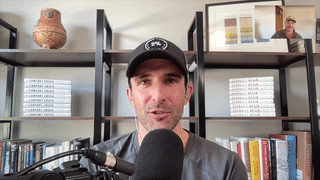Michael Easter wants you to take the stairsThe journalist tells Substack’s Clyde Rathbone which health practices actually make a differenceMichael Easter is a bestselling author, journalist, and professor whose work explores how we can leverage modern science and evolutionary wisdom to perform better and live healthier. Through his Substack, Two Percent with Michael Easter, he offers readers insights to help them ignore the noise and focus on research-backed tips for a happier, healthier life. Michael’s reach is vast: his ideas have been adopted by professional athletes, astronauts, musicians, and Fortune 500 companies, and his work has been featured by outlets including Good Morning America, the New York Times, NPR, Fox News, MSNBC, and The Joe Rogan Experience. His books, The Comfort Crisis and Scarcity Brain, have both earned spots on the New York Times bestseller list. His work has had an impact in unexpected places, too—one of his books, as he was told by an inmate at Rikers Island, is “the most popular book in prison,” and that same book is also a favorite among some of the largest church groups in the U.S. During our conversation, Michael shared the most important things you can do for your health, how he writes fitness tips that work for Tour de France cyclists and 80-year-olds alike, and how taking the stairs—both literally and metaphorically—can change your life. Quotes from the conversationOn starting Two PercentA book might run at 80,000 words, but I would write 160,000 words, and I’d have all this useful stuff that would just go nowhere. And it seemed like Substack might be a good way to cover topics in health and wellness in a way that brought people in, that felt a little more timely, and that allowed me to write in real time. I didn’t know what would happen when I launched this, but I decided to roll the dice—you know, I live in Vegas, so yeah, roll the dice! But it’s been awesome. It’s been one of the best career decisions I’ve ever made, if not the best career decision I’ve ever made. On the benefits of discomfortIf you look at what most improves human health and well-being and mental health in the context of modern life, it’s uncomfortable, right? It’s exercise. Exercise is uncomfortable. It’s not eating the ninth slice of pizza in one sitting; it’s having some rails on your eating. It’s having hard conversations to unpeel deeper elements of mental health. And when I was working at Men’s Health [magazine], I could see that there were benefits to discomfort. And if you really look at how the world has changed, over the last 100, 200, 500, 2 million years, we’ve slowly added more and more comfort into our lives. And that’s been a good thing for progress, but it hasn’t always been good for health and wellness. On the traditional Japanese ritual “misogi”If you look at how humans learn and grow, we don’t learn when things are perfect, right? We learn by being pushed up to an edge, learning what it’s like there, and then seeing, “I figured this out. I’m actually a lot more capable than I realized.” Now, the issue is that today, even though things are great, we don’t really have these moments that are great teachers that show us what we’re capable of. So the idea of misogi is that you take on one big epic task a year in nature in order to expand those edges, to see what you’re capable of. There are two rules to misogi: One is that your misogi task has to be really hard. And two is don’t die. On what the government gets rightI think the number one thing that you can do for your health is exercise. I think that the government’s exercise recommendations are actually rather reasonable. They’re low, but the reason they’re low is because the government also goes, well, we don’t want you guys exercising all the time; we also need an economy here, right? So as long as you can hit a couple hours of cardio total a week and lift some weights a couple of days, I think that that is one of the best things you can do for your health. On mental health vs. physical healthThe internet has made a lot of people crazy, long story short. So having practices that help your mental health is great. If you have a six-pack and can run a five-minute mile yet you’re a crazy person, we probably need to rebalance those books a little bit. So finding practices for mental health, things like extended time in nature. I think meditation can be very useful for some people—it doesn’t work for all people all the time, but that can help build strong relationships with others. Time and silence, really figuring out your own path with all these things, is important. On chasing dopamineI think it’s really about giving people context instead of just saying, “Hey, if you get in an ice bath, a study showed that dopamine rises.” It’s like, yeah, well, dopamine rises if I go down to the casino down the road and smoke a heater and hit the spin button 50 times. Just because dopamine rises doesn’t mean shit, right? Show notes
|





